Inheritance Tax (IHT) in the UK has often been dubbed as a ‘voluntary tax.’ It’s an odd concept, isn’t it? Who would voluntarily pay any tax given the choice? In reality, it’s simply a colloquial reference due to the perception that, with careful planning and taking advantage of the available reliefs and exemptions, individuals can significantly reduce (or even eliminate) the amount of IHT payable on their estates. Yes – that’s where expert advice comes in! As the intricacies of IHT are manyfold, it’s essential to be acquainted with the specifics. And, even more so if you hope to navigate its complexities successfully. That’s where Inheritance Tax specialists (like ours) really come into their own.
So, what do you need to know? Let’s take a quick look…
Lifetime Planning Strategies – what are they?
‘Lifetime planning strategies’ are essential tools in ensuring that hard-earned wealth is preserved for future generations. These strategies centre around making provisions today to minimise the future impact of IHT on your estate. By taking action now, you can strategically reduce the potential IHT burden on your beneficiaries once you have gone. It’s definitely not a cheery topic, we know! But, surely five minutes thinking about the unthinkable is a fair trade for the future peace of mind and prosperity of those you leave behind.
The good news is that there are many ways you can ensure your wealth is dispersed while limiting IHT. So, we’ve covered a few of the more popular methods below:
Gifting and Potentially Exempt Transfers (PETs)
One of the most effective lifetime planning strategies is gifting. By gifting assets to loved ones during your lifetime, you can reduce the value of your estate, hence potentially lowering IHT liability. But there’s a catch: for the gift to be entirely exempt from IHT, you need to survive for seven years after making it. These gifts are known as Potentially Exempt Transfers (PETs). If you don’t survive the seven years, the gift might still be subject to IHT, albeit potentially at a reduced rate.
You also need to be mindful whether a gift might trigger other implications. For example, gifting assets such as property or shares will likely trigger capital gains tax liabilities. This is because gifts are still assessed to capital gains tax based upon the market value of the asset. If the gift is of a business asset or to a trust it might though be possible to claim holdover relief.
Given none of us know what the future holds a key aspect of this is to identify assets to gift that are definitely surplus to your requirements. A true gift cannot be undone and you may well have many years left in you yet!
You also need to have a suitable person to gift an asset to. It could be a blessing or a curse, but with lifetime gifting you are likely to see how your beneficiary spends your hard earned money.
Setting Up Trusts
Trusts are another avenue that fall within our category of lifetime planning strategies. They allow for assets to be held on behalf of beneficiaries. Depending on the type of trust chosen, there are different tax implications. For instance, Discretionary Trusts offer flexibility in terms of who, when, and how beneficiaries receive assets. However, they come with periodic and exit tax charges. On the other hand, Interest in Possession Trusts gives beneficiaries a right to income from the trust. Remember thought, the underlying assets might still be subject to IHT.
Trusts certainly have their place for anyone who wants to retain some control over how and when funds are made available to beneficiaries. They can also be useful should a child be in a potentially volatile marriage. This is because assets held in trust are usually outside the scope of matrimonial action. Beneficial tax status is also given to trusts that are set up to look after the interests of a vulnerable beneficiary.
You can’t take it with you – so why not spend it?
An obvious way to reduce the value of your estate is to spend it. Why not enjoy your retirement, you have earned it! Of course, as mentioned before, do also ensure you keep enough by to cover all eventualities.
Consider being charitable
Gifts to registered charities are exempt from Inheritance tax. So, you can divert money from the taxman to a good cause instead! It is also worth mentioning that should 10% of a person’s net estate be left to charity, the rate of IHT is reduced from 40% to 36%. Often this tax saving will more or less cover the cost of the charitable legacy.
Investing in Exempt Assets
Certain assets are exempt from IHT. Investing in these can be an astute strategy to mitigate IHT exposure. For example, shares in unlisted companies and some AIM-listed companies might qualify for Business Property Relief (BPR) and can be completely exempt from IHT if held for at least two years. On a cautionary note these investments usually come with more risk than standard investment opportunities. As such, it would always be sensible to seek expert financial advice before making any significant commitments.
Maximise the benefits of pensions
Recent regulatory changes mean unused pension funds (which usually are not included within a persons taxable estate) can be passed on to any nominated beneficiary. A sensible strategy can therefore be to leave pension funds untouched for as long as possible into retirement. That’s even if it means living off savings! After all, this helps to reduce the taxable value of your estate. The pension fund could be kept in reserve, in case it is needed later in life.
Making regular gifts out of surplus income
The nil rate band has been frozen for 14 years now. This means that as estates have naturally grown in value, so too has their exposure to tax. If your annual income exceeds your requirements, this surplus can be gifted without tax consequence as long as it is done on a regular basis. It would be helpful to keep a record of regular annual expenditure in order to prove what income is surplus to your requirement.
Do you qualify for the Residential Nil Rate Band?
Extra relief is available for individuals who leave an interest in their home (or the proceeds from the sale of their home) to lineal descendants. However, relief is restricted should the persons estate exceed £2m, and no relief can be claimed by anyone with an estate worth more than £2.7m.
Aggregation can cause a problem here should everything be left to a surviving spouse. A potential solution for married couples is to consider using your Wills to transfer assets to children/grandchildren following the first death. Also try and take steps to keep within the £2m threshold.
The Role of Our Trained IHT Specialists
Inheritance Tax can be labyrinthine, with numerous reliefs, exemptions, and strategies available. And, that’s before we even think about the anti avoidance rules to be wary of. Our trained inheritance tax specialists are adept at navigating this maze. Providing a tailored approach, they ensure that your lifetime planning strategies are both efficient and in line with your objectives. Whether you’re considering gifting, establishing a trust, or exploring other means of safeguarding your assets, our specialists are on hand to offer the guidance and expertise you need.
Protecting Your Legacy
Lifetime planning strategies are about more than just tax efficiency; they’re about ensuring your wishes are adhered to and that your loved ones are taken care of. Engaging in these strategies today can pave the way for a brighter, more secure future for your beneficiaries. So, don’t leave it to chance; take control of your legacy today!
As always, we offer a free introductory meeting so that you can find out what we do and how we do it! So, please do call us on 01243 782 423 to book your no-obligation meeting – there’s nothing to lose and potentially everything to gain!
If you’d like to speak to one of our experts about your accounts, please call 01243 782 423. Alternatively, you can email us from our contact page and we will be in touch!
We also update our YouTube Channel regularly with new content. Please see here: Lewis Brownlee YouTube channel.





